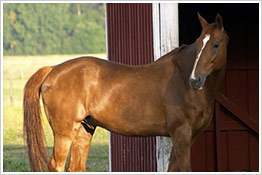A Horsemanship Program that Builds Character and Community
By Nancy Humphrey Case
Nancy Humphrey Case, author of Simple Prayers for people of all faiths (or no faith), has a horsemanship and riding program that is not just about riding; it also helps refine or develop character. Nancy explains how the program makes a difference.
MFE
 I started the program five years ago with two small ponies and a desire to share my love of horses. Initially, I was basically giving pony rides to little kids. That has evolved into a comprehensive program for about 17 children, ages 3 to 12, that teaches confidence, empathy, patience, perseverance, thoroughness, respect for the horses and for other students in the program, self-control, and a healthy work ethic! I started the program five years ago with two small ponies and a desire to share my love of horses. Initially, I was basically giving pony rides to little kids. That has evolved into a comprehensive program for about 17 children, ages 3 to 12, that teaches confidence, empathy, patience, perseverance, thoroughness, respect for the horses and for other students in the program, self-control, and a healthy work ethic!
The horses become teachers to the children. That’s because they reflect the attitude of the rider. Horses are very sensitive and can be easily frightened. The children learn that if they want a horse to be obedient, they have to notice how the horse is feeling, how to respond gently but firmly to the horse, how to lead. The riders learn self-discipline as well as confidence because the horses give the kids instant feedback about their own attitudes and behaviors in a very nonjudgmental way.
One parent in our club has told me repeatedly that coming to our barn is like balm for her family. Others, too, have remarked on the calm and loving atmosphere. That’s a big part of this program. When a child arrives, I reach out in love. I care about each one, and they feel that and are nicer to each other. One 12-year-old boy said that what he loves about working with horses is that it calms him.
There’s a thread throughout the Bible that shows us it’s our nature to love because that’s the nature of our Creator. Deuteronomy has the idea that “underneath are the everlasting arms” (33:27). The Old Testament shows God’s love for us—look at Isaiah and Ezekiel, for example—and the New Testament throws light on the nature of divine Love, showing that it’s natural for us to be loving to each other, including horses.
Our pony club has three rules: 1) everyone helps out with chores until all the work is done; 2) everyone must wear a helmet when riding; 3) everyone must be polite—to each other, to parents, to me, and to the ponies and horses. It’s really about the Golden Rule.
The way I’ve structured the riding club is a little different from other lesson programs. The families don’t pay for lessons; they pay a share of what it costs to keep the four club ponies and horses. The club members help with labor. They help take care of the horses, do chores, unload hay deliveries, and pitch in with whatever needs doing around the barn. Lessons include working with the horses on the ground (rather than in the saddle). Even three-year-olds begin learning to lead the ponies. Older children practice leadership skills by moving them through obstacles. The families who can’t afford the upkeep give me more labor, such as fixing fences, doing extra chores on weekends, or caring for the ponies in the winter.
It’s a great feeling of community. The parents are a big part of the program. They supervise grooming and tacking up, set up and take down jumps and obstacles, and lead horse-related learning activities for the children who are waiting their turn to ride. I think they enjoy being here because they get to see their children’s progress first hand, week by week.
When one 10-year-old girl came to me four years ago, she was very shy and didn’t want to do sports, but she loved riding and working with the ponies. Now, besides being an excellent rider, she’s the best soccer player on her team. Her dad attributes her success to this program.
Other children have had various fears to overcome, and it’s wonderful to see them rise to those challenges and succeed. I find that if their challenge level is thoughtfully managed and they’re given plenty of loving support as well as practical direction, they succeed and develop confidence.
It’s all based on love, and love makes a difference. |

